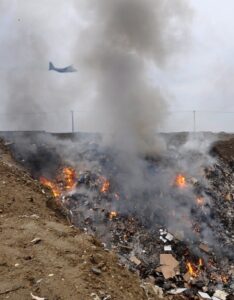Eligibility Expanded the First Day of This Month for Toxic Exposures

In 2012, a C-130 Hercules transport plane flies through a tower of smoke caused by open burning in a trash pit at Bagram Airfield. A $5.5 million trash disposal plant came online that year, reducing the amount of smoke and air pollution discharged into the air. Army photo
WASHINGTON, DC — As of the first day this month, the VA expanded and extended eligibility for VA healthcare for specific veterans of the Gulf Wars and post-9/11 era.
That means that hundreds of thousands of veterans exposed to toxic material will be eligible for VA care. In addition, Vietnam War veterans exposed to Agent Orange are now eligible, if they have hypertension or monoclonal gammopathy of undetermined significance (MGUS). The Agent Orange hypertension claims alone have the potential to affect as many as 500,000 Vietnam veterans, according to news reports.
Since President Joe Biden signed the bipartisan Sergeant First Class Heath Robinson Honoring our Promise to Address Comprehensive Toxics (PACT) Act into law on Aug. 10, veterans have filed more than 200,000 total claims, an increase of more than 21% over the same period last year. As of late September, VA has already received more than 70,000 PACT Act-related claims from veterans since the signing day.
All told, the PACT Act is sparking one of the largest expansions of VA healthcare and benefits in United States history. “This expansion will bring generations of new veterans into VA healthcare, and increase the healthcare benefits of many more, which will result in the one outcome that matters most: better health outcomes for veterans,” said Denis McDonough, secretary of Veterans Affairs. “I highly encourage these veterans to apply now for the healthcare they’ve earned and deserve.”
Beginning this month, post-9/11 veterans who did not previously enroll in VA healthcare will have a one-year window to enroll, if they:
- Served on active duty in a theater of combat operations during a period of war after the Persian Gulf War, or
- Served in a combat against a hostile force during a period of hostilities after Nov. 11, 1998, and
- Were discharged or released from active service between Sept. 11, 2001, and Oct. 1, 2013.
In addition, veterans who served on active duty in a theater of combat operations during a period of war after the Persian Gulf War will be eligible for care. This includes veterans who, in connection with service during such period, received:
- The Armed Forces Expeditionary Medal,
- Service Specific Expeditionary Medal,
- Combat Era Specific Expeditionary Medal,
- Campaign Specific Medal, or
- Any other combat theater award established by federal statute or executive order.
In terms of Vietnam-era veterans, eligibility is available now for those who served in the following locations and time periods:
- The Republic of Vietnam between Jan. 9, 1962, and May 7, 1975;
- Thailand at any U.S. or Royal Thai base between Jan. 9, 1962, and June 30, 1976;
- Laos between Dec. 1, 1965, and Sept. 30, 1969;
- Certain provinces in Cambodia between April 16, 1969, and April 30, 1969; Guam or American Samoa (or their territorial waters) between Jan. 9, 1962, and July 31, 1980;
- Johnston Atoll (or on a ship that called there) between Jan. 1, 1972, and Sept. 30, 1977.
The VA has made all conditions listed in the PACT Act presumptive for benefits as of Aug. 10.
Another result of the PACT Act is that VA clinicians will begin providing 5-minute toxic exposure screenings to all veterans enrolled in VA healthcare in November. A pilot last month screened 13,380 veterans across 12 medical centers over a two-week period. The testing resulted in a 37.4% concern of exposure among those veterans.
To help veterans who think they might be eligible for services under the new law, VA has launched VA.gov/PACT. On that website, which already has had more nearly 2.5 million views, veterans and their families can learn about the PACT Act and apply for healthcare or benefits.
The PACT Act added more than 20 burn pit and other toxic exposure presumptive conditions, expanding benefits for Gulf War era and post-9/11 veterans.
These cancers are now presumptive:
- Brain cancer
- Gastrointestinal cancer of any type
- Glioblastoma
- Head cancer of any type
- Kidney cancer
- Lymphatic cancer of any type
- Lymphoma of any type
- Melanoma
- Neck cancer of any type
- Pancreatic cancer
- Reproductive cancer of any type
- Respiratory (breathing-related) cancer of any type
These illnesses are now presumptive:
- Asthma that was diagnosed after service
- Chronic bronchitis
- Chronic obstructive pulmonary disease (COPD)
- Chronic rhinitis
- Chronic sinusitis
- Constrictive bronchiolitis or obliterative bronchiolitis
- Emphysema
- Granulomatous disease
- Interstitial lung disease (ILD)
- Pleuritis
- Pulmonary fibrosis
- Sarcoidosis
